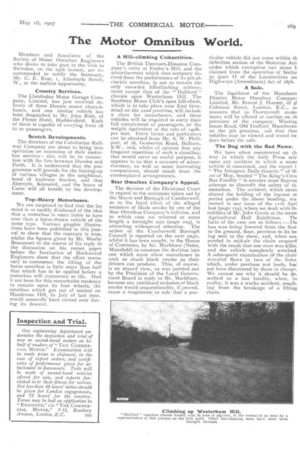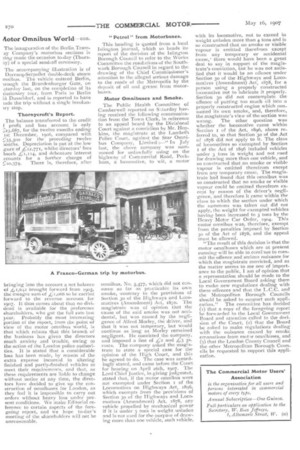The directors of the Caledonian Railway Company are about to
Page 7

Page 8

If you've noticed an error in this article please click here to report it so we can fix it.
bring into operation an extension of their motorbus services : this will be in connec tion with the line between Dundee and Perth. It is understood that the programme will provide for the linking-up of various villages in the neighbourhood of Inchture Station, and that Abernyte, Kinnaird, and the braes of Carse will all benefit by the development, Top-Heavy Motorbuses.
We are surprised to find that the lay mind is so tardily disabused of the idea that a motorbus is more liable to turn over than a horse-drawn vehicle of the same type. Various graphic illustrations hare been published in this journal to show that the contrary is true, whilst the figures given by Mr. Worby Beaumont in the course of his reply to the discussion on his recent paper before the Institution of Mechanical Engineers show that the effort necessary to commence the tilting of the horse omnibus is little more than half that which has to be applied before a motorbus will commence to tilt. Had it not been for this remarkable tendency to remain upon its four wheels, ' the omnibus which got out of control on Handcross Hill, in July of last year, would assuredly have turned over during its descent.
A Hill-climbing Competition.
The British Thomson-Houston Company's entry at Frorne's Hill, and the advertisement which that company derived from the performance of its petiol-. electric omnibus, is not to remain the only recorded hill-climbing achievement except that of the " Hanford " chassis upon Westerham Hill. The Southern Motor Club's open hill-climb, which is to take place near East Grinstead on the 22nd proximo, will include a class for motorbuses, and these vehicles will be required to carry their full complement of passengers, or the weight equivalent at the rate of i4olb. per seat, Entry forms and particulars can be obtained from Mr. S. W. Phillpott, of 18, Gosherton Road, Balharn, SM., and, whilst of opinion that any frequent repetition of such a classification would serve no useful purpose, it appears to us that a measure of advertisement, as well as some interesting comparisons, should result from the contemplated arrangements.
Star Omnibus Company's Appeal.
The decision of the Divisional Court in regard to the summons taken out by the Mayor and Borough of Camberwell, as to the legal effect of the alleged emission of black smoke by one of the Star Omnibus Company's vehicles, and to which case we referred at some length a fortnight ago (page 224), is attracting widespread attention. The action of the Camberwell Borough Council is reported on the next page, whilst it has been sought, in the House of Commons, by Mr. Markham (Notts, Mansfield) to construe the decision into one which must allow motorbuses to emit as much black smoke as their drivers can produce. This, of course, is an absurd view, as was pointed out by the President of the Local Government Board in reply to Mr. Markham, because any continued emission of black smoke would unquestionably, if proved, cause a magistrate to rule that a par ticular vehicle did not come within th definition section of the Motorcar Act: under which e-xemption can alone b claimed from the operation of Sectio 30 (part II of the Locomotives an Highways (Amendment) Act of 1878.
A Sale.
The liquidator of the Mancheste District Motor Omnibus Compan, Limited, Mr. Ernest J. Hussey, of si Coleman Street, London, EC., at nounces that so Thornycroft mom buses will be offered at auction on th premises of the company, Westing house Road, Old Trafford, iilanchestei on the sth proximo, Ind that thes vehicles may be viewed arid tested tw days before the sale.
The Dog with the Bad Name.
We have often commented on th way in which the daily Press seiz upon any accident in which a moto vehicle is concerned, and the report " The Islington Daily Gazette " of th 1st of May, headed "The King's Gros Bus Fatality "is another most flagran attempt to discredit the safety of th motorbus. The accident, which neces sitated the holding of the inquest re ported under the above heading, wa named in our issue of the slth Apri last (page 154), where we dealt with Oil exhibits of Mr. John Goode at the recen Agricultural Hall Exhibition. Ths facts of the case are as follows :—Tlu bus was being lowered from the first to the ground, floor, previous to its be ing sent to the show, and, when sus pended in mid-air the chain snapped with the result that one man was killeC and the vehicle completely wrecked. A subsequent examination of the chair revealed flaws in two of the links
which, under previous test loads, haC not been discovered by those in charge,
We cannot see why it should be described as a bus fatality, when, in reality, it was a works accident, resulting from the breakage of a lifting chain.
The inauguration of the Berlin Tramay Company's motorbus sections is ingmade the occasion to-day (Thursay) of a special send-off ceremony.
The accompanying illustration is of Darracq-Serpollet double-deck steam rnnibus. The vehicle entered Berlin, trough the Brandenburger Gate, on aturday last, on the completion of its tissionary tour, from Paris to Berlin la Dusseldorf, and is reported to have lade the trip without a single involuntry stop.
Thornycroft's Report.
The balance transferred to the credit f profit and loss account is only ;23,687, for the twelve months ending ist December, 1906, compared with (.;35,5oo for the preceding twelve tenths. Depreciation is put at the low .gure of 2_.;12,771, whilst directors' fees bsorb L;t,rr4, and debenture interest .ccounts for a further charge of (;1o,374. There is, therefore, after bringing into the account a net balance of -LI,6.42 brought forward from 1905, the meagre sum of £1,068 to be carried forward to the revenue account for 1907. It thus comes about that no dividend is available for the preference shareholders, who got the full rate last year. Probably the most interesting portion of the report, from the point of view of the motor omnibus world, is that which relates that this branch of the business has given the directors much anxiety and trouble, owing to the action of the London police authorities. It is stated that a considerable loss has been made, by reason of the extra expense incurred in altering finished and partly-finished vehicles to meet their requirements, and that, as these requirements are liable to change without notice at any time, the directors have decided to give up the construction of omnibuses for London, as they feel it is impossible to carry out orders without heavy loss under pre. sent conditions. We make Editorial reference to certain aspects of the foregoing report, and we hope to-day's meeting of the shareholders will not be unreasonable. This heading is quoted from a local Islington journal, which so heads its report of the decision of the lsling-ton Borough Council to refer to the Works -Committee the resolutions of the Southwark Borough Council in regard to the drawing of the Chief Commissioner's attention to the alleged serious damage to the roads of the Metropolis by the deposit of oil and grease from motorbuses.
Motor Omnibuses arid Smoke.
The Public Health Committee of Camberwell reported on Saturday having received the following communication from the Town Clerk, in reference to an appeal heard by the Divisional Court against a conviction by Mr. Hopkins, the magistrate at the Lambeth Police Court, against the Star Omnibus Company, Limited :—" In July last, the above company was summoned for unlawfully using on the highway of Commercial Road, Peckham, a locomotive, to wit, a motor
omnibus, No. 5,577, which did not consume so far as practicable its own smoke, •contrary to the provisions of Section 3o of the highways and Locomotives (Amendment) Act, 1870. The magistrate was of opinion that the cause of the said smoke was not accidental, but was caused by the negligence of Alfred Morley, the driver, and that it was not temporary, but would continue as long as Morley remained negligent. He convicted the company, and imposed a fine of L2 and L3 3s. costs. The company asked the magistrate to state a special case for the opinion of the High Court, and this he agreed to do. The case was accordingly stated, and came before the Court for hearing on April 26th, 1907. The Lord Chief Justice, in giving judgment, stated that, if the motor omnibus were not exempted under Section i of the Locomotives on Highways Act, 1896, which exempts from the provisions of Section 3o of the Highways and Locomotives (Amendment) Act, 1878, any vehicle propelled by mechanical power if it is under 3 tons in weight unladen and is not used for the purpose of drawing more than one vehicle, such vehicle, with its locomotive, not to exceed in weight unladen more than 4 tons and is so constructed that no smoke or visible vapour is emitted therefrom except from any temporary or accidental cause,' there would have been a great deal to say in support of the magistrate's conviction, but he was not satisfied that it would be an offence under Section 3o of the Highways and Locomotives (Amendment) Act, 1878, for a person using a properly constructed locomotive not to lubricate it properly. Section 30 did not contemplate the offence of putting too much oil into a properly constructed engine which consumed its own smoke, and, therefore, the magistrate's view of the section was wrong. The other question was whether the locomotive came within Section s of the Act, 1896, above referred to, so that Section 30 of the Act of 1878 did not apply to it. The class of locomotives so exempted by Section of the Act of 1896 included vehicles under 3 tons in weight and not used for drawing more than one vehicle, and so constructed that no smoke or visible vapour is emitted therefrom except from any temporary cause. The magistrate had found that this omnibus was so constructed that no smoke or visible vapour could be emitted therefrom except by reason of the driver's negligence, and therefore it came within the class to which the section under which the summons was taken out did not apply, the weight for exempted vehicles having been increased to 5 tons by the Heavy Motor Car Order, 1904. This motor omnibus was, therefore, exempt from the penalties imposed by Section 3o of the Act of 1878, and the appeal must be allowed.
"The result of this decision is that the motor omnibuses which are at preSent running will be able to conthue to commit the offence and serious nuisance for which the magistrate convicted, and as the matter seems to me one of importance to the public, I am of opinion that a representation should be made to the Local Government Board asking them to make new regulations dealing with these offences and that the L.C.C. and the Metropolitan Borough Councils should be asked to support such application." The committee has decided (I) that a copy of the foregoing report be forwarded to the Local Government Board and attention called to the decision of the Court, (2) that the Board be asked to make regulations dealing with the nuisance caused by smoke emanations from motor omnibuses, and (3) that the London County Council and the other Metropolitan Borough Councils be requested to support this application.






















